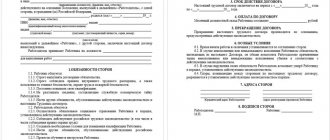The concept of the term “place of work” in an employment contract
According to Article No. 57 of the Labor Code of the Russian Federation, the place of work must be indicated in the employment contract. The problem is that Russian labor legislation does not clearly define the concept of “place of work.” There are no specific explanations in the Labor Code, so different interpretations are possible.
The essence of the term “place of work”
The Labor Code of the Russian Federation does not give a clear definition of the term, but in practice it means the place where the company is located. But it is not clear whether it is necessary to indicate a specific address or just the city where the company’s main office is located. As for the addresses of business units, the law requires that they be indicated.
If only a locality is indicated without an exact address, this can cause a lot of misunderstandings. A fairly common example: if a company has several branches in one city, then the manager can send a subordinate to work in any of them. In this case, the employee expects to work at a specific facility. All these issues must be resolved before signing the employment agreement.
Some specificity is already visible in the formulation of the RF Armed Forces. According to the court ruling, the concept of “place of work” consists of two elements:
- Company name;
- the locality in which the organization is located (within the existing ATD).
If we analyze recent judicial precedents, then during the trial they are guided precisely by the determination of the Armed Forces of the Russian Federation.
“Other locality” can mean not only another city or region, but also another state. In this case, the location of the organization means its address.
Procedure for changing data in the contract
This information can be edited by the same employer, that is, we are talking about the same company. For example, a company employee may be transferred to the same position, but to a branch in another locality. All amendments are regulated by Article No. 57 of the Labor Code of the Russian Federation. If the employer changes, the place of work in the employment contract remains the same, since the employee will have to enter into a new work agreement.
Place of work and workplace
The concept of “workplace” is defined by Article No. 209 of the Labor Code of the Russian Federation. By worker we already mean a specific room where the labor process takes place (for example, the production workshop of a confectionery factory).
Important! The concepts of “place of work” and “workplace” should not be confused, as they are fundamentally different. If the first term does not have a clear definition and denotes the location of the enterprise, then the “workplace” is the room where the employee performs his work functions.
Also, these concepts are radically different in terms of legal burden.
- The place of work must be indicated on the contract forms, while the indication of the workplace is optional.
- The place of work allows the manager to change the location of the employee within the same city, while the workplace is clearly fixed.
- Changing the workplace requires agreement with the subordinate, while the place of work is changed in the contract unilaterally (you only need to warn the employee).
If you register only the workplace, then the employer will have a lot of additional legal obligations due to the change of location of the worker (transfer). When moving, the employee has the right to file a lawsuit and is likely to win it, since in this case it will be considered illegitimate.
The concept of a legal address
To determine the place of work during the trial, the legal address of the manager (state registration address) can be used. However, the difficulty lies in the fact that in some cases the address of the actual place of work and the legal address may not coincide. It turns out that the provisions of the agreement between the subordinate and the employer distort working conditions, and this is a violation of the law.
Is it allowed to have two jobs?
No, you are not allowed to have two jobs at the same time. At the same time, the Labor Code allows two jobs to be specified in the agreement if this is true and the worker works at two sites.
Certain categories of workers
If an employee does not stay on the premises of the office while performing his duties, and the work is of a traveling nature (truck driver, promoter, etc.), then the name of the company must be indicated as the place of work.
In addition, the employee has the opportunity to perform duties remotely (including in another region or country).
In such a situation, the place of work is considered to be the legal address of the organization, while the actual location of the employee is not taken into account.
The only example where a specific address must be indicated in a contract with employees is the profession of a shift worker. The explanation for this is the large distance between the organization and the workplace.
Name as place of work
Some lawyers believe that it is not worthwhile to indicate the name of the company as the place of work in the employment contract, since a third-party company in any case cannot act as an employer for a specific employee. The name of the organization is considered to be one of the parties to the contract, but not its condition. Even if we consider the name as a condition, it cannot be agreed upon with the other party.
Specific address
There is an opinion that the description of one locality in the contract is not enough, therefore it is necessary to indicate a specific address, but the provisions of the Labor Code say nothing about this.
Based on Article No. 57, the specific location of the employee must be registered only in cases where we are talking about branches located in another area.
If all divisions are located within the same city, then it is enough to indicate the name of the locality.
Legal significance of the place of work
Place of work is one of the main points of a sample employment contract, so you need to make sure that the contract has the correct interpretation of this term. Despite the ambiguity of the labor code, after analyzing all the above legal aspects and compiling their characteristics, the manager can come to a common denominator.
Labor legislation on the employee’s right to work in conditions that meet labor protection requirements
The employee’s right to work in conditions that meet labor protection requirements is established by Art. 219 Labor Code of the Russian Federation. According to this article, every employee has the right to:
- a workplace that meets labor protection requirements;
- compulsory social insurance against industrial accidents and occupational diseases in accordance with federal legislation <2>;
- obtaining reliable information from the employer, relevant government bodies and public organizations about labor conditions and safety in the workplace, about the existing risk of damage to health, as well as about measures to protect against exposure to harmful and (or) hazardous production factors;
- refusal to perform work in the event of a danger to his life and health due to violation of labor protection requirements, with the exception of cases provided for by federal laws, until such danger is eliminated;
- provision of personal and collective protective equipment in accordance with labor protection requirements at the expense of the employer;
- training in safe labor methods and techniques at the expense of the employer;
- professional retraining at the expense of the employer in the event of liquidation of a workplace due to violation of labor protection requirements;
- a request for an inspection of labor conditions and safety at his workplace by the federal executive body authorized to exercise federal state supervision over compliance with labor legislation;
- appeal to state authorities of the Russian Federation, state authorities of constituent entities of the Russian Federation and local governments, to the employer, to associations of employers, as well as to trade unions, their associations and other representative bodies authorized by employees on labor protection issues;
- personal participation or participation through his representatives in the consideration of issues related to ensuring safe working conditions at his workplace, and in the investigation of an industrial accident or occupational disease that has occurred to him;
- an extraordinary medical examination (examination) in accordance with medical recommendations with retention of his place of work (position) and average earnings during the said medical examination (examination);
- compensation established in accordance with the Labor Code, collective agreement, agreement, local regulations, employment contract, if he is engaged in heavy work, work with harmful and (or) dangerous working conditions.
<2> The legal, economic and organizational foundations of compulsory social insurance against industrial accidents and occupational diseases, as well as the procedure for compensation for harm caused to the life and health of an employee during the performance of his duties under an employment contract, are determined by Federal Law of July 24, 1998 N 125- Federal Law “On compulsory social insurance against accidents at work and occupational diseases.”
For your information. The amount of compensation for workers engaged in heavy work, work with harmful and (or) dangerous working conditions, and the conditions for their provision are established in the manner determined by the Government of the Russian Federation, taking into account the opinion of the Russian Tripartite Commission for the Regulation of Social and Labor Relations. At present, one should be guided by the Decree of the Government of the Russian Federation of November 20, 2008 N 870 “On the establishment of reduced working hours, annual additional paid leave, increased wages for workers engaged in heavy work, work with harmful and (or) dangerous and other special working conditions "
Article 220 of the Labor Code of the Russian Federation provides guarantees of the right of workers to work in conditions that meet labor protection requirements. In particular, it has been established that the working conditions specified in the employment contract must comply with labor protection requirements.
If an employee refuses to perform work in the event of a danger to his life and health (except for cases provided for by the Labor Code of the Russian Federation and other federal laws), the employer is obliged to provide the employee with another job while such danger is eliminated.
If the employee is not provided with personal and collective protective equipment in accordance with established standards, the employer does not have the right to require the employee to perform work duties and must pay for the downtime that arises for this reason in accordance with the Labor Code of the Russian Federation.
An employee’s refusal to perform work in the event of a danger to his life and health due to violation of labor protection requirements or from performing heavy work and work with harmful and (or) dangerous working conditions not provided for in the employment contract does not entail bringing him to disciplinary liability .
Note!
Change of place of work at the initiative of the employer
Changes in the terms of the employment contract determined by the parties for reasons related to changes in organizational or technological working conditions
(as amended by Federal Law No. 90-FZ of June 30, 2006)
(see text in previous
In the event that, for reasons related to changes in organizational or technological working conditions (changes in equipment and production technology, structural reorganization of production, other reasons), the terms of the employment contract determined by the parties cannot be preserved, they may be changed at the initiative of the employer, with the exception of changes in the employee’s labor function.
The employer is obliged to notify the employee in writing of the terms of the employment contract determined by the parties, as well as the reasons that necessitated such changes, in writing no later than two months in advance, unless otherwise provided herein.
If the employee does not agree to work under the new conditions, then the employer is obliged to offer him in writing another job available to the employer (both a vacant position or work corresponding to the employee’s qualifications, and a vacant lower position or lower paid job), which the employee can perform taking into account his health status. In this case, the employer is obliged to offer the employee all vacancies available in the given area that meet the specified requirements. The employer is obliged to offer vacancies in other localities if this is provided for by the collective agreement, agreements, or employment contract.
If there is no specified work or the employee refuses the offered work, the employment contract is terminated in accordance with paragraph 7 of part one of Article 77 of this Code.
In the event that the reasons specified in part one of this article may lead to mass dismissal of workers, the employer, in order to preserve jobs, has the right, taking into account the opinion of the elected body of the primary trade union organization and in the manner established by Article 372 of this Code, to adopt local regulations , introduce a part-time working day (shift) and (or) part-time working week for up to six months.
If an employee refuses to continue working part-time (shift) and (or) part-time work week, then the employment contract is terminated in accordance with paragraph 2 of part one of Article 81 of this Code. In this case, the employee is provided with appropriate guarantees and compensation.
Cancellation of a part-time working day (shift) and (or) part-time working week earlier than the period for which they were established is carried out by the employer, taking into account the opinion of the elected body of the primary trade union organization.
Changes to the terms of the employment contract determined by the parties, introduced in accordance with this article, should not worsen the position of the employee in comparison with the established collective agreement or agreements.
Art. 74 Labor Code of the Russian Federation. Changes in the terms of the employment contract determined by the parties for reasons related to changes in organizational or technological working conditions
The pause that arose upon Russia's accession to the WTO provides an opportunity to reassess the country's path to the World Trade Organization from the perspective of today, and not from the perspective of ten years ago. After all, the main protocols on the terms of accession to the WTO arose before the promulgation of the main provisions of Strategy 2020, and with its approval, many previous approaches simply became outdated.
Russia submitted an application to join the WTO back in 1993, and real negotiations began in 1995.
The lengthy negotiation process clearly shows that the main players of the WTO, primarily America, do not seek to let Russia into this organization on terms acceptable to Russia.
They liked the raw material Russia of the 90s more, with an open, growing Russian market for their goods and services. In the structure of retail trade commodity resources, import receipts already account for about 50 percent, and in large cities this figure exceeds 70 percent.
During the period of “non-accession” to the WTO, our economy could not feel any economic losses for the reason that the WTO mainly stimulates trade in finished goods and high-tech products, while the basis of Russian exports are still raw materials and fuel, which are already admitted to foreign markets almost without restrictions. Needless to say, the structure of exports in these years could not be quickly changed towards processing industries due to excessive wear and tear and backwardness of capacities.
In this regard, quite natural questions arise: is the country’s economy ready for immediate membership in the WTO?
It is clear that we are primarily talking about the conditions of entry. There are several significant points here. Firstly, on the path to integration into the world economy, it is unacceptable to be drawn into a regime of unequal foreign economic exchange.
Trade turnover indicators indicate the possibility of such a scenario. Moreover, they continue to persistently demand that we reduce and even completely eliminate existing export customs duties.
This will lead to irreparable budget losses and will finally secure the country as a raw material appendage of the world economy.
Secondly, a prerequisite for a country's accession is to bring Russian legislation into compliance with WTO standards. In general, this work has been completed. But at the same time, our negotiating partners are limiting our efforts to change current legislation aimed at increasing added value and developing an innovative economy.
Our position on this issue is unchanged: we will formulate national legislation capable of ensuring the implementation of Strategy 2020 - the strategy for an innovative breakthrough.
Thirdly, certain sectors of the economy are unacceptably overly relying on the expected gradual transition from 1 year to 7 years to fulfill the agreed conditions for the opening of the Russian market, which can, to a certain extent, allow the industry to adapt to the upcoming WTO membership.
According to expert data, the weighted average rate of import customs duty for the entire product range exceeds 10 percent. Reducing them by more than half (to 3-5% of those active in the WTO) will most painfully affect the domestic mechanical engineering industry.
And the level of its development determines the competitiveness of the national economy. This is an industry that ensures the national security and independence of the country.
Therefore, without waiting for the start, it is advisable to have calculated scenarios for entering the WTO in line ministries and agencies, at every enterprise and organization.
Fourthly, the fall of the stock market in August 2008 demonstrated the weakness and unpreparedness of our financial and banking system to function in the WTO environment. Immediate entry retains great risks of canceling financial support measures for domestic producers provided for in the federal budget for 2008-2010.
Article 72.1. Transfer to another job. Moving
(introduced by Federal Law No. 90-FZ of June 30, 2006)
Transfer to another job - a permanent or temporary change in the labor function of an employee and (or) the structural unit in which the employee works (if the structural unit was specified in the employment contract), while continuing to work for the same employer, as well as transfer to work in another location together with the employer. Transfer to another job is permitted only with the written consent of the employee, except for the cases provided for in parts two and three of Article 72.2 of this Code.
This is important to know: Personal injury claim: sample 2021
At the written request of the employee or with his written consent, the employee may be transferred to permanent work with another employer. In this case, the employment contract at the previous place of work is terminated (clause 5 of part one of Article 77 of this Code).
The employee’s consent is not required to move him from the same employer to another workplace, to another structural unit located in the same area, or to assign him work on another mechanism or unit, unless this entails a change in the terms of the employment contract determined by the parties.
It is prohibited to transfer or relocate an employee to a job that is contraindicated for him due to health reasons.
Order to change place of work
An employment contract is a document that establishes and regulates the relationship between employees and their employer.
It records the agreement on issues such as the workplace and profession or position, safe working conditions and decent wages, the rights of participants in the relationship and their responsibilities, etc.
The law assumes that changes to the text of a document can be made in compliance with special rules. The most common reason for revision is a change in place of work at the initiative of the employer. Let's look step by step how to carry out this procedure correctly.
Options for changing the terms of the contract
The Labor Code contains the following situations when changes to working conditions at the initiative of the employer are allowed:
- Art. 72.1 - translation;
- Art. 74 — change in technological or organizational working conditions;
- Art. 60.2 - combination of positions.
Important! Any changes to an already signed employment contract can only be made in the same way as it was originally concluded - by mutual and voluntary agreement. The employer does not have the right to do this by his own will; the law directly prohibits him from doing so. Art. 72 of the Labor Code of the Russian Federation prescribes asking and then receiving a clear positive answer from the employee.
Transfer of an employee
A transfer must be understood as a change that affects one of the main points of the contract: a specialty or job function.
The reason for the management's decision to introduce such changes may be not only the successes and achievements of a particular employee, but also his inadequacy for the vacancy.
Less often, the transfer will be forced, for example, in emergency situations, if necessary, to replace an absent colleague. The following will also be considered a translation:
- changing not just a workplace, but also a department, of course, if it is clearly stated in the employment contract;
- moving to another location with the whole company.
Note! Translation has important differences from similar movement, that is, performing the same work, but at a different workplace, device, machine, car, etc. In this case, no changes to the profession itself or other clauses of the contract occur (Article 72.1 of the Labor Code of the Russian Federation). The transfer can be permanent or temporary, lasting up to one year. But it is always necessary to comply with two essential requirements:
- the presence of the employee’s written will;
- impossibility of assigning work that is prohibited to the employee by medical professionals.
Changes in technological or organizational working conditions
Such changes are understood as caused by the economic situation, internal processes and scientific and technological progress, the need to change the management structure, equipment fleet, product range, and number of employees. According to the law, the employer is not obliged to report to employees, but must follow a certain procedure for notifying all interested parties.
https://www.youtube.com/watch?v=ureQ1A3ImBs
Changes may affect a variety of aspects of the employment contract: labor function, amount and methods of remuneration, working and free time, etc. But, as a rule, they concern not just individual employees, but the organization’s team as a whole. Therefore, an important stage in the implementation of such innovations will be obtaining the consent of the local trade union organization representing the employees.
Download for viewing and printing:
General procedure for registering changes made
The steps and actions of the employer's HR department when documenting any changes to employment contracts should be as follows:
- Notice. The law obliges the employee to notify the employee in writing and at least 2 months in advance. The notice can most often be given in person, but it is acceptable to send it by certified mail.
- Receiving a response from each employee with consent. This may be a handwritten inscription on the proposal or a statement from an employee.
- Familiarization of the employee with his job responsibilities at another workplace and other local regulatory documents.
- Drawing up and signing an additional agreement. In the future, it becomes part of a valid and registered employment contract (Article 57 of the Labor Code of the Russian Federation).
- Issuance of an order. To do this, it is convenient to use the unified T-5 form. The use of document forms approved by Goskomstat is not mandatory, but it is convenient for personnel officers and managers.
- Familiarization with the employee's order. This fact is certified by his own signature. Second copies of the order and additional agreement are given to the employee.
- Making entries in the employee’s personal card (form T-2) and his work book. But only if a transfer occurs, that is, the labor function (position) of the employee changes. Moving, combining positions or changing work hours is not reflected in the work book and personal card.
Employer's responsibilities: improving working conditions for employees
Labor legislation stipulates that the employer is obliged to annually ensure the implementation of measures to improve working conditions, including those developed based on the results of certification of workplaces for working conditions, and assessment of the levels of occupational risks. In order to implement this norm, Order of the Ministry of Health and Social Development of Russia dated 01.03.2012 N 181н <1> approved the Standard List of measures annually implemented by the employer to improve working conditions and safety and reduce levels of occupational risks. What are these events? What are their sources of funding? What liability can be held against employers who are guilty of violating labor laws and other acts containing labor law norms? This will be discussed in the article.
<1> Registered with the Ministry of Justice of Russia on March 19, 2012 N 23513.
Employers have the responsibility to organize the work of employees and create normal working conditions for them. What are normal working conditions? Let's turn to Art. 163 “Ensuring normal working conditions to meet production standards” of the Labor Code of the Russian Federation. This article states that normal conditions include, in particular:
- good condition of premises, structures, machines, technological equipment and equipment;
- timely provision of technical and other documentation necessary for work;
- proper quality of materials, tools, other means and items necessary to perform the work, their timely provision to the employee;
- working conditions that meet labor protection and production safety requirements.
These conditions, to a certain extent, specify the employer’s responsibilities to ensure labor safety and provide employees with equipment, tools, technical documentation and other means necessary for the performance of labor duties (Article 22 of the Labor Code of the Russian Federation).
Change of workplace at the initiative of the employer
an employment contract is one of the stages in the development of legal relations, associated mainly with changes in the basic terms of the contract.
the main terms of the contract can occur on: the initiative of the employee; initiative of the employer; reasons independent of either the employee or the employer (for example, for reasons related to a change in the owner of the organization’s property, the organization’s jurisdiction, its reorganization, changes in organizational or technological working conditions, Art.
Change of employment contract
In an objective sense, this concept characterizes a relatively isolated institutional formation, a sub-institution of an employment contract. This is a set of rules of law that determine the grounds, conditions, procedure and methods for the parties to transform the individual rules of conduct agreed upon at the conclusion, or to suspend the execution of rights and obligations.
In the event that, for reasons related to organizational or technological working conditions (in engineering and production technology, structural reorganization of production, other reasons), those determined by the parties to the agreement cannot be preserved, they are allowed at the initiative of the employer, with the exception of the employee’s functions.
The employer is obliged to notify the employee in writing of the upcoming terms of the contract determined by the parties, as well as the reasons that necessitated the need for such changes, no later than two months in advance, unless otherwise provided by this Code.
The employee does not agree to change working conditions
Unlike staff reduction (when the employer is not required to prove the expediency of eliminating a particular unit), the terms of the employment contract must be justified by specific reasons. In the event of a legal dispute, it is the employer who will have to prove that he did not have the opportunity to maintain the working conditions as they were (clause
21 Resolution of the Plenum of the Armed Forces of the Russian Federation dated March 17, 2004 No. 2).
Changing the terms of an employment contract without the employee’s consent
The general provisions of the Code of the Russian Federation provide for changes in the terms of an employment contract only by agreement of the parties (Article 72 of the Labor Code of the Russian Federation). However, there are exceptions that provide for the notification procedure for the employee about changes in the terms of the employment contract.
Thus, Article 74 of the Labor Code of the Russian Federation provides for the possibility of changing the terms of an employment contract (with the exception of the employee’s labor function) for reasons related to changes in organizational or technological working conditions.
Changing the terms of an employment contract at the initiative of the employer
social and economic - everything that is associated with wages, social status and service to the employee; organizational and technical – directly related to the work process; household and economic – opportunities for food, recreation, sanitary and living conditions; climatic – terrain features (location, geology, weather and nature, etc.)
An employment contract is a document that establishes and regulates the relationship between employees and their employer.
It records the agreement on such issues as the workplace and profession or position, safe working conditions and decent wages, the rights of participants in the relationship and their responsibilities, etc.
e. The law assumes that changes to the text of a document can be made in compliance with special rules.
What is the procedure for amending employment contracts?
An employment contract can be changed for many reasons.
In order to correctly carry out the amendment process, you need to know the main rules - which Laws to use, what the general procedure for amending an agreement is.
when transferring an employee from one type of activity to another; the director of the organization has changed; the employee was suspended from performing his duties; one of the parties to the agreement (or both) wanted to change the provisions of the employment contract; the operating mode has changed; there was a need to conclude a fixed-term contract.
Labor Code, N 197-FZ, Article 74 of the Labor Code of the Russian Federation
In the event that, for reasons related to changes in organizational or technological working conditions (changes in equipment and production technology, structural reorganization of production, other reasons), the terms of the contract determined by the parties cannot be preserved, they can be changed at the initiative of the employer, with the exception of labor employee functions. The employer is obliged to notify the employee in writing of the terms of the employment contract determined by the parties, as well as the reasons that necessitated such changes, in writing no later than two months, unless otherwise provided by this Code.
Source: https://juridicheskii.ru/izmenenie-rabochego-mesta-po-iniciative-rabotodatelja-38415/
Algorithm for making changes
The employer's procedure is as follows:
- Issuance of an order on organizational and/or technological changes at the enterprise.
- Publication of a draft order for future changes.
- Preparation of an additional agreement or a new version of the entire contract.
- Introducing design changes to accompanying documents: shift schedule, enterprise work schedule, staffing schedule, job descriptions, regulations on certain types of enterprise activities, regulations on divisions and other local acts.
- Familiarization of the employee with draft documents for signature (either they are signed in a special column in the draft order, or in separately issued notifications). Introductory events are carried out at least two months before the amendments to the employment contract come into force.
- Issuing an order for changes.
- Concluding additional agreements or new contracts.









